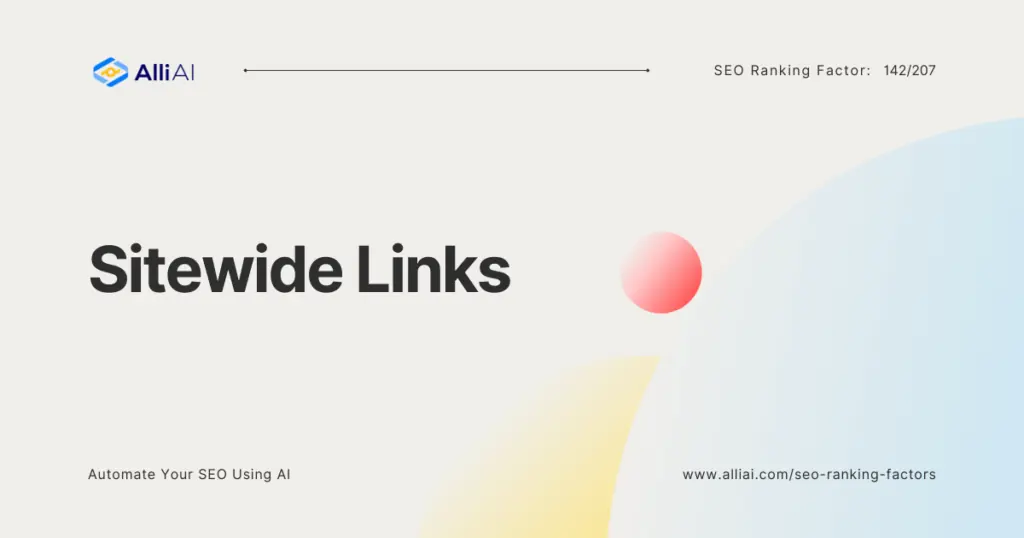Sitewide Links
Sitewide links are ubiquitous in the world of web design and SEO, consistently appearing on every page of a website, usually in the footer, header, or sidebar. These are akin to the foundation stones of a massive structure, intended to be omnipresent and fundamental to the architecture of the site.
Consider a billboard advertisement that you see on every street corner in a city. This billboard is promoting a specific product; similarly, sitewide links promote certain pages or external sites across all pages of a website, ensuring that the message (or link) is widely seen and accessible.
Understanding Sitewide Links
Sitewide links are hyperlinks consistently present on every page of a website, typically located in the header, footer, or sidebar. They can be classified as:
Internal Sitewide Links: These links direct users to other pages within your website, serving both navigational and SEO purposes. They guide users to important sections like the homepage, contact page, or product categories while also distributing link equity (or “link juice”) throughout your site.
External Sitewide Links: These links point to external websites, often used for partnerships, sponsorships, or to provide additional resources. However, excessive use can dilute your website’s link equity and may raise red flags with search engines.
How Sitewide Links Affects SEO
Sitewide links are significant for several reasons:
Domain Authority: Receiving sitewide links from well-respected websites can significantly boost a domain’s authority. However, it’s crucial to note that search engines like Google have evolved to differentiate between genuine endorsements and manipulative link practices.
Link Juice Distribution: Properly implemented sitewide links can effectively distribute link equity across linked pages, potentially improving their ranking capability.
User Experience: Strategically used sitewide links enhance navigation by providing easy access to important pages, improving the overall user experience and site performance.
However, search engines have become adept at identifying spammy or manipulative sitewide links. Updates like Google’s Penguin algorithm have specifically targeted these practices, penalizing sites that overuse or misuse sitewide links.
Best Practices for Sitewide Link Implementation
To maximize the benefits and minimize the risks of sitewide links, follow these best practices:
Prioritize Relevance: Ensure all sitewide links are highly relevant to your website’s content and target audience. Avoid linking to pages that provide little value to users.
Limit External Links: Use external sitewide links sparingly. Focus on linking to authoritative, high-quality websites that complement your content.
Use Descriptive Anchor Text: For internal sitewide links, use clear, descriptive anchor text that accurately reflects the linked page’s content. This helps both users and search engines understand the link’s purpose.
Monitor and Adjust: Regularly audit your sitewide links to assess their performance and relevance. Remove or replace links that are no longer beneficial or that may be negatively impacting your SEO.
How Can Alli AI Help with Sitewide Links?
At Alli AI, we understand the nuances involved in leveraging sitewide links for SEO. Our tool is designed to analyze your site’s link structure, enabling you to identify which sitewide links are beneficial and which might be harming your SEO performance.
- Optimization Suggestions: Alli AI offers customized recommendations for optimizing your sitewide links, ensuring they add value to your site without triggering search engine penalties.
- Risk Assessment: We help in assessing the risk associated with sitewide links, especially when it comes to outbound links, providing insights into avoiding potential negative impacts on your SEO.
- Monitoring & Reporting: Our platform continuously monitors the performance of your sitewide links and provides detailed reports, allowing you to make informed decisions and adjustments.
By utilizing Alli AI, you can streamline your sitewide link strategy, ensuring that these links serve their intended purpose without jeopardizing your site’s search engine rankings.
FAQ
How many sitewide links are too many?
The key is not in the quantity but in the quality and relevance of the links. Ensure that sitewide links are to highly relevant and useful pages. Overloading a site with unnecessary or irrelevant sitewide links can harm SEO.
Do sitewide links from another site hurt my SEO?
If the site linking to you is reputable and relevant to your niche, sitewide links can be beneficial. However, if the links are from low-quality or spammy sites, they could indeed hurt your SEO.
How often should I review my sitewide links?
Regular reviews are necessary, ideally every few months or when major updates to your site occur. This ensures that all links are functioning, relevant, and adding value to your visitors.
Conclusion
Sitewide links are a powerful tool in the arsenal of SEO, but like any powerful tool, they must be used wisely. Understanding the impact these links have on SEO and leveraging tools like Alli AI to manage them can ensure they contribute positively to your website’s search engine performance. By monitoring and optimizing sitewide links with precision, online visibility and user experience can both be enhanced, driving forward the success of your website in the competitive online world.
Remember, in the realm of SEO, strategy is key, and with the right approach, sitewide links can play a pivotal role in achieving your website’s SEO goals.






